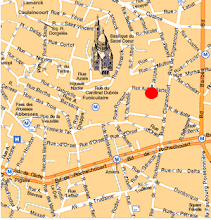 A demonstration in support of the Tata car plant in Singur, India. Land clashes have held up many industrial projects in the country. (Parth Sanyal/Reuters)
A demonstration in support of the Tata car plant in Singur, India. Land clashes have held up many industrial projects in the country. (Parth Sanyal/Reuters)By Somini Sengupta
Wednesday, September 17, 2008
SINGUR, India: Barely a month before the introduction of the world's least expensive car from a new factory on these former potato and rice fields, a peasant uprising has prompted Tata, one of the most powerful Indian conglomerates, to suspend work on the plant and consider pulling out.
The standoff is the most prominent example of a dark cloud hanging over India's economic transition: How to divert scarce fertile farmland to industry in a country where more than half of the people live off the land?
At the heart of the challenge, one of the most important facing the Indian government, is not only how to compensate peasants who make way for India's industrial future, but also how to prepare them - in great numbers - for the new economy India wants to enter.
In recent years, clashes over land have dogged several major industrial projects in almost every corner of this crowded democracy of 1.1 billion people, most of them rural and poor.
In the eastern state of Orissa, betel leaf farmers have held up a $12 billion project by Posco, the South Korean steel maker, occasionally kidnapping company officials. In western Goa, several proposed Chinese-style special economic zones were scrapped after sustained public protests. And outside Mumbai, India's commercial capital, village councils have insisted on a referendum this month on an economic zone proposed by Mukesh Ambani, the country's richest man.
In nearly all of these cases, the peasants who resist most intensely are often those who know they are qualified to do little beyond eke out a living off of the land.
If that fundamental anxiety feeds their protests, farmers and farmhands, often egged on by the politicians who seek their support, also stage protests to ratchet up the price of the land or to renegotiate deals.
The target of their ire is often the government, which in most cases acquires the land and turns it over to industrial developers. The central government has not finished a long-awaited national policy on compensating those who lose their land.
"If the price is right, people will sacrifice the emotional attachment, but if you no longer have the guarantee of living off the land, then what do you do?" said Subir Gokarn, chief economist for Standard & Poor's in India. "The people who are being displaced are not the people who see themselves as benefiting immediately from the employment opportunities."
Medha Patkar, one of the best-known opponents of large industrial projects in India, said, "Land is livelihood, it's not just property."
Last month, in this rich farm belt in the state of West Bengal, protesters laid siege to the new Tata Motors plant, on one occasion preventing workers from leaving.
The protesters want the government to return roughly a third of the 997 acres, or 403 hectares, that the state acquired for the Tata factory. Some of the land was taken by force from farmers.
Their demands have since led the state government, controlled by an elected Communist administration, to sweeten the deal without taking apart the factory site.
On Sunday, in a bid to assuage protesters, the government announced a more generous compensation package for those who had been evicted. It included a 50 percent increase in the price paid for the property and job training for one member of each displaced family. The governing party and its opponents have been staging competing protests this week.
That new deal only revealed the deep wedge of anxiety that the factory has driven through this cluster of villages.
"We are farmers," said Tayab Ali Mandal, of the village of Joymolla. "We know only farm work, we don't know any paper-pencil work." He gave up his land last year, but bitterly. Now he wants it back, and he rejected the government's latest offer of a job in the plant.
He said he would rather have his 16-year-old son continue to work in a small factory embroidering clothes, a traditional craft in his community. "I won't go inside that place, even to urinate," he said. "We are disgusted by that place."
Gopal Santra and his clan, who refused to accept money for the land they lost, said they hoped the renewed agitation would prompt the state to raise its offer even more.
The Santras owned land across the street from the Tata plant, which they sold a month ago for more than four times the price the state is now offering. Still others, like Sheik Muhammad Ali, who welcomed the Nano, Tata's flat-faced, pint-size car, to his fields, threatened to put the naysayers in their place.
Ali had readily given up his land and through his contacts with government officials, started a business supplying cement to the developer.
On Sunday, he was seething at the protesters who had halted work on the plant for the past two weeks and in turn, his business.
"There's a limit to our patience," he said. "If you take my plate of rice, will I just let you go off with it?"
Bidyut Kumar Santra, a rare high school graduate in Joymolla, was among the lucky few to get a job on the assembly line, and, in turn, realize how poorly equipped he was to keep up with events on the factory floor. The engineers all spoke English, to him an alien tongue.
"I feel ashamed, like what kind of education did I get?" Santra said the other day. He vowed to make certain that his son, who is in first grade, learned to speak English.
The villages of Singur, where the Nano was to be produced, stand at the crossroads of two Indias.
For Tata, it is ideally located along a new national highway heading north to New Delhi, the capital, and near an important east-west artery.
For farmers, it is ideally located on the fertile delta plains of the Ganges River and fed by irrigation canals, making the earth so rich and red that it yields two rice harvests a year, in addition to potatoes, cucumbers and squash.
West Bengal lured Tata here with heavy incentives, including a generous land lease and tax breaks from the state's industrial development agency.
Some of the details of the company's contract with the government have emerged in recent days, prompting the company to go to court, where it blocked further disclosures.
If Tata were required to give back 300 acres of land from the factory site, as the opposition demands, it would have to evict auto parts makers who are setting up shop next to the main Nano plant.
Their proximity allows Tata to save on the cost of production. Those savings and the generous land and tax deal allow Tata to sell the Nano at a price of less than $2,500.
The plant's fate is uncertain. Tata, while welcoming the government's proposed compensation package, has remained silent on its plans.
The company has several other plants where it could produce the Nano in time for the Hindu festival season in October, traditionally a time of big spending.
Tata has dangled the possibility of making the Nano elsewhere if the cost of production and the price of car rise too high.
http://www.iht.com/articles/2008/09/17/business/land.php
A Place in the Auvergne
A Place in My Country
Ian Walthew
Farm Blogs
Ranch Blogs
Rural Blogs
Countryside Blogs
Smallholding Blogs
Urban Homesteading Blogs
Homesteading Blogs
Homestead Blogs
Allotment Blogs
Apiculture Blogs
Bee-keeping Blogs
Auvergne
Auvergnate
Auvergnat
Auvergnats
France
Rural France
Blogs about France
Paris / Montmartre/ Abbesses holiday / vacation furnished apartment rental





















No comments:
Post a Comment